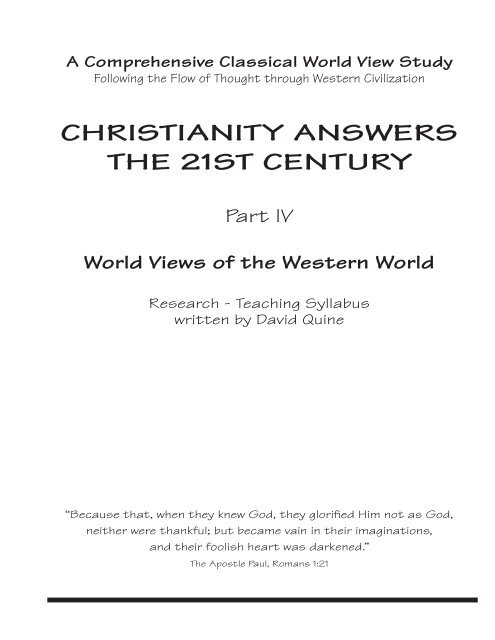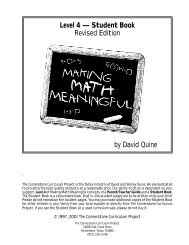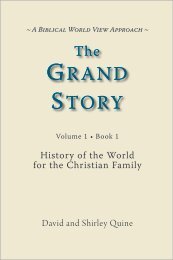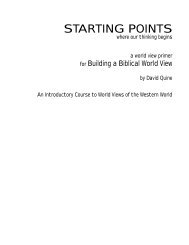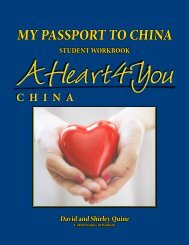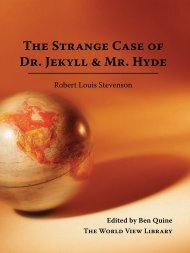ChriStiAnity AnSWerS the 21St Century - Cornerstone Curriculum
ChriStiAnity AnSWerS the 21St Century - Cornerstone Curriculum
ChriStiAnity AnSWerS the 21St Century - Cornerstone Curriculum
You also want an ePaper? Increase the reach of your titles
YUMPU automatically turns print PDFs into web optimized ePapers that Google loves.
A Comprehensive Classical World View Study<br />
Following <strong>the</strong> Flow of Thought through Western Civilization<br />
Christianity answers<br />
<strong>the</strong> 21st century<br />
Part IV<br />
World Views of <strong>the</strong> Western World<br />
Research - Teaching Syllabus<br />
written by David Quine<br />
“Because that, when <strong>the</strong>y knew God, <strong>the</strong>y glorified Him not as God,<br />
nei<strong>the</strong>r were thankful; but became vain in <strong>the</strong>ir imaginations,<br />
and <strong>the</strong>ir foolish heart was darkened.”<br />
The Apostle Paul, Romans 1:21
A special thanks to my family for listening, talking,<br />
and discussing <strong>the</strong> various issues found within <strong>the</strong>se pages;<br />
to <strong>the</strong> fourteen children in my first World View Class which<br />
was held in our living room each Tuesday and Thursday morning;<br />
and to my wife, who has walked with me<br />
moment-by-moment, in my walk with Christ.<br />
This series is dedicated to families who are equipping and discipling <strong>the</strong>ir<br />
children to take <strong>the</strong> Truth of Christianity and <strong>the</strong> Life of Christ into <strong>the</strong> culture.<br />
May we know our adequacy is from Christ who empowers us in this endeavor.<br />
Front Cover<br />
The Course of Empire: Desolation<br />
(fifth in <strong>the</strong> Series of five paintings)<br />
Thomas Cole (1802-1848) Artist<br />
Courtesy of<br />
The New-York Historical Society<br />
The Luman Reed Collection<br />
New York, New York<br />
The information in this research syllabus will be of great value to your child for years to come.<br />
He or she will refer to it often. The pages are to be written on, and <strong>the</strong>refore, <strong>the</strong> book is consumable.<br />
Please do not copy this book.<br />
The <strong>Cornerstone</strong> <strong>Curriculum</strong> Project is simply our family.<br />
We are dedicated to providing <strong>the</strong> best quality product at a<br />
reasonable price. Our ability to do so is dependent on your support.<br />
Second Edition Copyright © 2006 David Quine<br />
Copyright © 1996, 1998 David Quine • Published by The <strong>Cornerstone</strong> <strong>Curriculum</strong> Project<br />
2006 Flat Creek Place • Richardson, Texas 75080 • 972-235-5149<br />
www.<strong>Cornerstone</strong><strong>Curriculum</strong>.com<br />
ii —The <strong>Cornerstone</strong> <strong>Curriculum</strong> Project © 2000 David Quine
World Views of <strong>the</strong> Western World<br />
An Interdisciplinary World View Approach<br />
Seven Areas of Interrelated Studies<br />
Philosophy & Theology • Literature • Art • Music • Government • Economics • Science<br />
Philosophy and Theology of <strong>the</strong> Western World …<br />
The major views of God, <strong>the</strong> universe, human nature and morality are examined, tracing <strong>the</strong> development of thought<br />
from <strong>the</strong> Hebrews, through <strong>the</strong> Greeks (Socrates, Plato, Aristotle), on to <strong>the</strong> Christians (Jesus, Paul, Augustine, Aquinas,<br />
Lu<strong>the</strong>r, and Calvin), concluding with Modern philosophy (Hume, Kant, Hegel, Kierkegaard, Nietzsche, and Sartre).<br />
Because it is believed that ideas have consequences, philosophy and <strong>the</strong>ology serve as <strong>the</strong> base on which all disciplines<br />
derived <strong>the</strong>ir thought and are <strong>the</strong>refore expressions of philosophy and <strong>the</strong>ology.<br />
Great Books of <strong>the</strong> Western World …<br />
Selections include works from <strong>the</strong> Bible, Homer, Plato, Aristotle, Virgil, Augustine, Dante, Milton, Donne, Dickens,<br />
Camus, Hemingway, and C.S. Lewis.<br />
Music of <strong>the</strong> Western World …<br />
A study of <strong>the</strong> development of music from <strong>the</strong> Gregorian Chant to classical music of <strong>the</strong> 20th <strong>Century</strong>. Emphasis<br />
is placed on <strong>the</strong> acquisition of fundamental musical knowledge and listening habits which enable a person to enjoy music<br />
perceptively and to appreciate it personally.<br />
Art of <strong>the</strong> Western World …<br />
A study of <strong>the</strong> development of art from <strong>the</strong> Early Christian period through <strong>the</strong> Byzantine, Renaissance and Reformation<br />
periods continued through <strong>the</strong> Romantic, Impressionistic, Post Impressionistic, and Modern periods.<br />
Economic Thought of <strong>the</strong> Western World …<br />
An evaluation of man’s ideas about economic <strong>the</strong>ory. The study is an analysis of <strong>the</strong> various schools of economic<br />
thought and <strong>the</strong> associated relationship to political policy. The Schools include Classical (Smith, Ricardo, Malthus),<br />
Communist (Marx, Engels), Austrian (Bohm-Bawerk, Menger, von Mises, Hayek), German Historic (von Schmoller), Chicago<br />
(Knight, Friedman), and Keynesian (Keynes).<br />
Law and Liberty of <strong>the</strong> Western World …<br />
An examination of <strong>the</strong> political, social, economic, religious, and cultural forces which have shaped American ideals<br />
and institutions. Emphasis is placed upon <strong>the</strong> thought of <strong>the</strong> Founding Fa<strong>the</strong>rs and <strong>the</strong> resulting constitution. Contrasts<br />
are made between <strong>the</strong> French and American Revolutions. Based upon <strong>the</strong> readings of Plato, The Federalist and<br />
Anti-Federalist, Tocqueville, Machiavelli, Rousseau, Locke, Burke, Paine, and Marx.<br />
Science: Understanding <strong>the</strong> Origin and Operation of <strong>the</strong> Universe …<br />
A critical assessment of science from Plato to Post-Darwin, tracing man’s attempt to explain <strong>the</strong> order, structure<br />
and origin of <strong>the</strong> universe.<br />
Forward— iii
Christianity answers <strong>the</strong> 21st century<br />
INTRODUCTION<br />
“Grasping for <strong>the</strong> Wind” Video by John Whitehead<br />
EXPLORING THE 20th <strong>Century</strong> Shift in THINKING<br />
Walden II by B.F. Skinner<br />
The Old Man and <strong>the</strong> Sea by Hemingway<br />
The Plague by Camus<br />
Star Wars by Lucas<br />
EXPLAINING THE 20th <strong>Century</strong> Shift in THINKING<br />
The Universe Next Door Chapters 4 - 8<br />
examining THE 20th <strong>Century</strong> Shift in THINKING<br />
The Universe Next Door Chapters 4 - 8<br />
Shifts in Science<br />
How Should We Then Live? Episode 6: The Scientific Age<br />
How Should We Then Live? Ch 8: The Breakdown in Philosophy and Science<br />
Darwin [dramatized audio recording]<br />
Of Pandas and People edited by Thaxton<br />
Darwin on Trial by Johnson<br />
Soul of Science - Thaxton<br />
Shifts in Philosophy and <strong>the</strong>ology<br />
The God Who is There Chapter 1: The Gulf is Fixed<br />
How Should We Then Live? Episode 7: The Age of Non-Reason<br />
How Should We Then Live? Chapter 8: The Breakdown in Philosophy and Science<br />
How Should We Then Live? Chapter 9: Modern Philosophy and Modern Theology<br />
The God Who is There Section I Chapter 2: The First Step in <strong>the</strong> Line of Despair<br />
Escape from Reason Chapters 3-4<br />
The God Who is There Section II Chapter 1: The Fifth Step: Theology<br />
Sophie’s World by Gaarder<br />
Rousseau’s Social Contract [dramatized audio ]<br />
David Hume [dramatized audio recording]<br />
Kant [dramatized audio recording]<br />
Hegel [dramatized audio recording]<br />
Kierkegaard [dramatized audio recording]<br />
Nietzsche [dramatized audio recording]<br />
Sartre [dramatized audio recording]<br />
taking 20th century thought into culture<br />
Through Art and Music<br />
How Should We Then Live? Episode 8: The Age of Fragmentation<br />
Adventures in Art<br />
How Should We Then Live? Chapter 10: Modern Art, Music, Literature, and Films<br />
Classical Composers and <strong>the</strong> Christian World View<br />
The God Who is There Section I Chapter 3-5; Section II Chapters 3,4<br />
iv —The <strong>Cornerstone</strong> <strong>Curriculum</strong> Project © 2000 David Quine
Through Government<br />
Civil War I and II [dramatized audio recordings]<br />
“Gettysburg” — The Movie<br />
“Gone with <strong>the</strong> Wind” — The Movie<br />
Additional Amendments [dramatized audio recordings]<br />
The Second American Revolution” book by Whitehead<br />
Through Economics<br />
Christianity: Capitalism with Compassion - adapted from Dr. Francis Schaeffer<br />
The Classical Economists (Smith/Ricardo/Malthus) [dramatized audio recording]<br />
Marx’s Das Kapital [dramatized audio recording]<br />
Early Austrian Economics (Bohm-Bawerk/Menger) [dramatized audio recording]<br />
The Keynesian Revolution [dramatized audio recording]<br />
The Austrian Case-Free Market Process (von Mises/Hayek) [dramatized audio recording]<br />
Frank Knight and <strong>the</strong> Chicago School [dramatized audio recording]<br />
Monetarism & Supply Side Economics (Friedman/Mundell) [dramatized audio recording]<br />
Hazlitt’s Economics in One Lesson [dramatized audio recording]<br />
Speaking out TO ANSWER THE 21st CENTURY<br />
in <strong>the</strong> areas of philosophy and Theology<br />
How Should We Then Live? “Special Note”<br />
The New Evidence, Introduction<br />
Escape from Reason, Chapter 7<br />
The God Who Is There - Section IV “Speaking Historic Christianity Into <strong>the</strong> 20th <strong>Century</strong>”<br />
The New Tolerance<br />
He is There, and He Is Not Silent Chapters 1-3<br />
The God Who Is There, Section III, Chapters 2-4<br />
Rediscovering Christ - Video - 2 Episodes<br />
The God Who Is There, Section III Chapter 5<br />
He Is There and He is Not Silent Chapter 4<br />
The New Evidence Chapter 32 -33; 34 - 37<br />
The New Evidence Chapters 1-4, 11-26, 27 - 31, 7<br />
in <strong>the</strong> areas of Psychology, Ecology, and Sociology<br />
True Spirituality<br />
Death and <strong>the</strong> Pollution of Man<br />
Moral Dilemmas<br />
How Should We Then Live? Episode 9 “The Age of Personal Peace and Affluence”<br />
How Should We Then Live? Chapter 11 “Our Society”<br />
How Should We Then Live? Episode 10 “Final Choices”<br />
How Should We Then Live? Chapter 12 “Manipulation and <strong>the</strong> New Elite”<br />
That Hideous Strength<br />
in <strong>the</strong> areas of Art and Music<br />
Adventures in Art<br />
Classical Composers and <strong>the</strong> Christian World View<br />
Conclusions<br />
Ecclesiastes<br />
How Should We Then Live? Chapter 13 “The Alternatives”<br />
Final essays<br />
Appendix<br />
Making a Transcript<br />
Forward—
Christianity Answers <strong>the</strong> 21st <strong>Century</strong><br />
Resources<br />
Grasping for <strong>the</strong> Wind, Whitehead (DVD)<br />
Waldon Two, SkinnerReformation Overview (DVD)<br />
The Old Man and <strong>the</strong> Sea, Hemingway<br />
The Plague, Camus<br />
Darwin on Trial, Johnson<br />
Of Pandas and People, Thaxton<br />
Economics in One Lesson, Hazlitt<br />
Sophie’s World, Gaader<br />
The Second American Revolution, Whitehead<br />
Tolerating <strong>the</strong> Intolerable by Josh McDowell<br />
The New Evidence, by McDowell<br />
Whatever Happened to <strong>the</strong> Human Race? (DVD)<br />
Pollution and <strong>the</strong> Death of Man, Schaeffer<br />
True Spirituality, Schaeffe<br />
That Hideous Strength, Lewis<br />
Audio Recordings [dramatized CDs]<br />
Darwin and Evolution<br />
David Hume<br />
Hegel<br />
Kant<br />
Kierkegaard<br />
Nietzsche<br />
Sartre<br />
Civil War Parts 1 & 2<br />
Classical Economists<br />
The German School<br />
Marx’s Das Kapital<br />
Keynesian Revolution<br />
Austrian Case for Free Market Process<br />
Frank Knight and <strong>the</strong> Chicago School<br />
Monetarism and Supply Side Economics<br />
The COre package for<br />
world views of <strong>the</strong> Western World<br />
* How Should We Then Live?, Schaeffer<br />
* How Should We Then Live? (DVD), Schaeffer<br />
* The Trilogy, Schaeffer<br />
* The Universe Next Door, Sire<br />
* Adventures In Art<br />
* Classical Composers<br />
Additional Resources used from<br />
Part III of World VIews of <strong>the</strong> Western World:<br />
* The Soul of Science, Pearcey and Thaxton<br />
* The Bill of Rights and Additional Amendments,<br />
audio recording<br />
vi —The <strong>Cornerstone</strong> <strong>Curriculum</strong> Project © 2000 David Quine
World Views of <strong>the</strong> Western World<br />
An Interdisciplinary World View Approach<br />
— Course Credits are based upon Carnegie Units—<br />
one credit is equivalent to one year of study<br />
Part IV Part II and Part III Part I<br />
Composition I 1/3 credit<br />
Literature: Ancient<br />
1 credit<br />
Philosophy/Theology<br />
1 credit<br />
Western Civilization<br />
1/3 credit<br />
Humanities<br />
1/3 credit<br />
World History<br />
1/3 credit<br />
— Total 3 1/3 Credits —<br />
Composition II 1/3 credit<br />
Literature: Medieval<br />
1 credit<br />
Philosophy/Theology II<br />
1 credit<br />
Music History/Appreciation I<br />
1/2 credit<br />
Art History/Appreciation II<br />
1/2 credit<br />
American Government<br />
1 credit<br />
Political Theory<br />
1 credit<br />
American History<br />
1 credit<br />
Science History I<br />
1/2 credit<br />
Western Civilization<br />
1/3 credit<br />
Humanities<br />
1/3 credit<br />
World History<br />
1/3 credit<br />
— Total 7 5/6 Credits —<br />
Composition iii<br />
Literature: Modern<br />
Philosophy/Theology III<br />
Music History/Appreciation I<br />
Art History/Appreciation III<br />
Economic Theory<br />
American History II<br />
Science History II<br />
Western Civilization<br />
Humanities<br />
World History<br />
1/3 credit<br />
1 credit<br />
1 credit<br />
1/2 credit<br />
1/2 credit<br />
1 credit<br />
1 credit<br />
1/2 credit<br />
1/3 credit<br />
1/3 credit<br />
1/3 credit<br />
— Total 6 5/6 Credits —<br />
Grand Total: 18 Credits<br />
Forward— vii
World Views of <strong>the</strong> Western World<br />
An Interdisciplinary World View Approach<br />
A Three Fold Purpose<br />
The spread of Christianity during <strong>the</strong> first century throughout <strong>the</strong> world was no accident. Under<br />
<strong>the</strong> direction of <strong>the</strong> Holy Spirit men and women of God were ready to give a logical defense for <strong>the</strong><br />
hope <strong>the</strong>y had within <strong>the</strong>m. It is said of <strong>the</strong> Apostle Paul that he reasoned … persuaded … spoke<br />
boldly … explained … convinced … warned … pleaded … gave a defense for … and contended for<br />
… truth in <strong>the</strong> synagogue as well as in <strong>the</strong> marketplace day by day.<br />
To Stand<br />
To give our children <strong>the</strong> ability to stand against <strong>the</strong> thoughts and ideas of <strong>the</strong> secular culture<br />
“People today are all mixed up in twisted ideas. They live in a welter of garbled voices, looking<br />
for directions from papers that come floating down like Alice in Wonderland’s cards, scattered like<br />
languages, from different thought-forms, different philosophies, all say that <strong>the</strong>re is no truth and no<br />
absolute upon which to live, no base for any choice of a moral standard. So whe<strong>the</strong>r one reads <strong>the</strong><br />
papers upside down left to right, knows one word in three, it doesn’t matter. There’ll be a new wind<br />
in a few days to blow more into one’s head. Perhaps you can even stop looking for papers among <strong>the</strong><br />
falling leaves. Just turn to <strong>the</strong> last piece of television advice, given in <strong>the</strong> most colorful or unforgettable<br />
way — whatever has stuck in <strong>the</strong> memory. One way is as good as any o<strong>the</strong>r! All law is obsolete.<br />
There are no more standards.” Yes, Edith Schaeffer is right. This is <strong>the</strong> advice given to and by our<br />
culture.<br />
As a result, we are no longer to be children, tossed here and <strong>the</strong>re by waves , and carried about by every wind of doctrine,<br />
by <strong>the</strong> trickery of men, by craftiness in deceitful scheming; but speaking <strong>the</strong> truth in love, we are to grow up in<br />
all aspects into Him… Ephesians 3:14-15<br />
To Speak<br />
To give our children an adequate and logical defense for <strong>the</strong> hope <strong>the</strong>y have within <strong>the</strong>m …<br />
There is no question that we are living in very difficult days. The spiritual battles are real and becoming<br />
much more intense. The clash of ideas is evident in nearly every discipline. The different world<br />
views are certainly waging war. Our tendency might be to retreat… to pull back from culture. What<br />
are we to do?<br />
For though we walk in <strong>the</strong> flesh, we do not war according to <strong>the</strong> flesh, for <strong>the</strong> weapons of our warfare are not of <strong>the</strong><br />
flesh, but divinely powerful for <strong>the</strong> destruction of fortresses. We are destroying speculations and every lofty thing<br />
raised up against <strong>the</strong> knowledge of God, and we are taking every thought captive to <strong>the</strong> obedience of Christ… II<br />
Corinthians 10: 3-5<br />
But sanctify Christ as Lord in your heats, always being ready to make a defense to everyone who asks you to give an<br />
account for <strong>the</strong> hope that is in you, yet with gentleness and reverence. I Peter 3:15<br />
Therefore, we are ambassadors for Christ, as though God were entreating through us… II Corinthians 5:20<br />
To Restore<br />
To give our children <strong>the</strong> ability to take <strong>the</strong> truth of Christianity into <strong>the</strong> various disciplines …<br />
And <strong>the</strong> Lord shall guide you continually and satisfy you in drought and in dry places, and make strong your bones.<br />
You shall be like a watered garden and like a spring of water, whose waters fail not. And your ancient ruins shall be<br />
rebuilt; you shall raise up <strong>the</strong> foundations of buildings that have laid waste for many generations; and you shall be<br />
called <strong>the</strong> repairer of <strong>the</strong> breach, <strong>the</strong> restorer of streets to dwell in. Isaiah 48: 11-12<br />
viii —The <strong>Cornerstone</strong> <strong>Curriculum</strong> Project © 2000 David Quine
CHristianity answers <strong>the</strong> 21st century - Part IV<br />
Scope and Sequence:<br />
In some cases <strong>the</strong> assignments are for one week. However, most assignments are given over a period<br />
of several weeks. This is in keeping with assignments given at <strong>the</strong> college level. Plan your time well. Work<br />
ahead. Be prepared. Before starting Week 1 you should read <strong>the</strong> FINAL ESSAYS writing assignments<br />
given for Weeks 37 and 38. Knowing <strong>the</strong>se assignments will help direct your thoughts during <strong>the</strong> year.<br />
INTRODUCTION<br />
❏ Week 1 _____________________________.....................................................................Introduction: 1 - 20<br />
“Grasping for <strong>the</strong> Wind” video series from John Whitehead<br />
EXPLORING THE 20th <strong>Century</strong> Shift in THINKING<br />
❏ Weeks 2 - 4 _________________________.............................................................................................1 - 38<br />
Walden II, by B. F. Skinner<br />
The Old Man and <strong>the</strong> Sea, by Earnest Hemingway<br />
The Plague, by Albert Camus<br />
Star Wars IV, V, I, by George Lucas<br />
Philosophy & Theology SCIENCE Literature<br />
EXPLAINING THE 20th <strong>Century</strong> Shift in THINKING<br />
❏ Week 5 ____________________________................................................................................... 39 - 70<br />
The Universe Next Door: Chapters 4-8<br />
examining THE 20th <strong>Century</strong> Shift in THINKING<br />
❏ Weeks 6 - 8 _________________________........................................................................................71 - 180<br />
How Should We Then Live? video “Scientific Age”<br />
How Should We Then Live? video “Breakdown in Philosophy and Science”<br />
Darwin and Evolution: audio recording- Knowledge Products<br />
Pandas and People by Charles Thaxton<br />
Darwin on Trial by Phillip Johnson<br />
Soul of Science: Chapters 8-10, by Charles Thaxton<br />
❏ Week 9 ___________________.............................................................................................................. 181 - 218<br />
The God Who is There Chapter 1: The Gulf is Fixed<br />
how Should We Then Live? Episode 7: The Age of Non-Reason<br />
How Should We Then Live? Chapter 8: The Breakdown in Philosophy and Science<br />
How Should We Then Live? Chapter 9: Modern Philosophy and Modern Theology<br />
<strong>the</strong> God Who is There Section I Chapter 2: The First Step in <strong>the</strong> Line of Despair<br />
escape from Reason Chapters 3-4<br />
<strong>the</strong> God Who is There Section II Chapter 1: The Fifth Step: Theology<br />
❏ Weeks 10 -13 ______________.....................................................................................................219 - 364<br />
Sophie’s World by Jostein Gaarder<br />
Hume: audio recording Knowledge Products<br />
Rousseau: audio recording Knowledge Products<br />
Kant: audio recording Knowledge Products<br />
Hegel: audio recording Knowledge Products<br />
Kierkegaard: audio recording Knowledge Products<br />
Nietzsche: audio recording Knowledge Products<br />
Sartre: audio recording Knowledge Products<br />
Forward— ix
Taking 20th century thought into <strong>the</strong> culture<br />
❏ Weeks 14 - 15 ________________________.................................................................................. 365 - 392<br />
ECONOMICS GOVERNMENT ART & MUSIC<br />
American history<br />
how Should We Then Live? Episode 8: The Age of Fragmentation<br />
Adventures in Art<br />
How Should We Then Live? Chapter 10: Modern Art, Music, Literature, and Films<br />
Classical Composers and <strong>the</strong> Christian World View<br />
<strong>the</strong> God Who is There Section I Chapter 3-5; Section II Chapters 3,4<br />
❏ Weeks 16 - 21 ________________________..................................................................................393 - 488<br />
Civil War I and II audio recordings Knowledge Products<br />
“Gettysburg” — The Movie<br />
“Gone with <strong>the</strong> Wind” — The Movie<br />
Additional Amendments audio recordings Knowledge Products<br />
The Second American Revolution by John Whitehead<br />
❏ Weeks 22 - 25 ________________________................................................................................ 489 - 520<br />
Christianity: Capitalism with Compassion (Bible Study)<br />
Classical Economics audio recordings Knowledge Products<br />
German Historical School audio recordings Knowledge Products<br />
Das Kapital audio recordings Knowledge Products<br />
Keynesian Revolution audio recordings Knowledge Products<br />
Austrian and Free Market audio recordings Knowledge Products<br />
Frank Knight and <strong>the</strong> Chicago School audio recordings Knowledge Products<br />
Monetarism and Supply Side audio recordings Knowledge Products<br />
Economics in One Lesson audio recordings Knowledge Products<br />
—The <strong>Cornerstone</strong> <strong>Curriculum</strong> Project © 2000 David Quine
Speaking out to answer <strong>the</strong> 21st century<br />
❏ Weeks 26 - 29 ________________________................................................................................... 521 - 591<br />
ArT Psychology PHILOSOPHY<br />
Music Ecology THEOLOGY<br />
SOCIOLOGY<br />
How Should We Then Live? Chapter: “Special Note”<br />
The New Evidence - Introduction by Josh McDowell<br />
Escape from Reason Chapter 7<br />
The God Who Is There - Section IV “Speaking Historic Christianity…”<br />
The New Tolerance by Josh McDowell<br />
He is There, and He Is Not Silent: Chapters 1-3<br />
The God Who Is There, Section III, Chapters 2, 3, 4<br />
Rediscovering Christ - Video<br />
The God Who Is There, Section III 5<br />
He Is There and He is Not Silent chapter 4<br />
The New Evidence: Chapter 32 -33; 34 - 37 by Josh McDowell<br />
The New Evidence: Chapters 1-4, 11-26, 27 - 31, 7 by Josh McDowell<br />
❏ Weeks 30 - 33............................................................................................................................................591 - 643<br />
True Spirituality, Francis Schaeffer<br />
Death and <strong>the</strong> Pollution of Man, Francis Schaeffer<br />
Whatever Happened to <strong>the</strong> Human Race, Francis Schaeffer<br />
how Should We Then Live? Episode 9 “The Age of Personal Peace and Affluence”<br />
how Should We Then Live? Chapter 11 “Our Society”<br />
how Should We Then Live? Episode 10 “Final Choices”<br />
how Should We Then Live? Chapter 12 “Manipulation and <strong>the</strong> New Elite”<br />
That Hideous Strength, C. S. Lewis<br />
❏ Weeks 34 - 35...........................................................................................................................................644 - 656<br />
Adventures in Art<br />
Classical Composers<br />
Conclusions<br />
❏ Week 36......................................................................................................................................................657 - 660<br />
Ecclesiastes, The Bible<br />
How Should We Then Live? Chapter 13 “The Alternatives”<br />
Final Essays<br />
❏ Weeks 37 - 38............................................................................................................................................661 - 693<br />
APPENDIX<br />
❏ Making a College Transcript................................................................................................................. 695 - 698<br />
Forward— xi
21st <strong>Century</strong> Man<br />
without God … without Truth… without Meaning to Life …<br />
“Because that, when <strong>the</strong>y knew God, <strong>the</strong>y glorified Him not as God,<br />
nei<strong>the</strong>r were thankful; but became vain in <strong>the</strong>ir imaginations,<br />
and <strong>the</strong>ir foolish heart was darkened.”<br />
The Apostle Paul, Romans 1:21<br />
“Actually, you can think of <strong>the</strong> Fall in three different ways. First <strong>the</strong>re was <strong>the</strong> original Fall of mankind,<br />
which ultimately explains why so many people here and abroad do not know <strong>the</strong> true God. You can<br />
also think of <strong>the</strong> Fall in terms of nations throughout history knowing <strong>the</strong> truth but <strong>the</strong>n turning from it.<br />
If you had stood in Trafalgar Square or Columbus Circle sixty years ago and asked a thousand people<br />
what <strong>the</strong> gospel is, most of <strong>the</strong>m could have told you. Maybe <strong>the</strong>y wouldn’t have accepted it, but <strong>the</strong>y<br />
could have told you what it is. However, if you stood today in Trafalgar Square, in Columbus Circle, or<br />
between <strong>the</strong> lions in front of <strong>the</strong> Art Institute in Chicago, and asked a thousand people what <strong>the</strong> gospel<br />
is, you would find very few who could answer. There was a much greater knowledge of Christianity in past<br />
generations. We are living in a post-Christian world today.<br />
“Thirdly, it is possible for individuals to go through this cycle — to know <strong>the</strong> truth and <strong>the</strong>n deliberately<br />
turn away from it. I’m always amazed at <strong>the</strong> number of famous people who have come out of missionary<br />
or ministerial homes, who have known <strong>the</strong> gospel, and yet later have deliberately turned away.<br />
“So <strong>the</strong> individual can fall away from <strong>the</strong> truth. Back of that we see whole cultures falling away. At<br />
<strong>the</strong> beginning stands <strong>the</strong> original Fall. So why are we in such a mess? What happened? Paul begins his<br />
answer by speaking of a time when mankind ‘knew God’ (Romans 1:21). This was of course absolutely<br />
true in <strong>the</strong> Garden of Eden. Adam and Eve knew God and had communion with Him. Similarly, <strong>the</strong>re was<br />
a time when our European and American culture knew God. Applying it to <strong>the</strong> individual <strong>the</strong>re are many<br />
nonbelievers who were taught about God as children.”<br />
Francis Schaeffer, The Finished Work of Christ: The Truth of Romans 1-8<br />
xii —The <strong>Cornerstone</strong> <strong>Curriculum</strong> Project © 2000 David Quine
Book of <strong>the</strong> Ages<br />
The Chronological Index given at <strong>the</strong> end of How Should We Then<br />
Live? is a listing of <strong>the</strong> key moments in history and <strong>the</strong> people who shaped<br />
those key moments. Dr. Schaeffer has focused on those significant turning<br />
points in Western Civilization. World Views of <strong>the</strong> Western World is an<br />
amplification and analysis of many of those key moments of history!<br />
Turn to <strong>the</strong> Chronological<br />
Index in How Should We<br />
Then Live? found on pages<br />
259-265.<br />
On pages 259 and 260 is a listing of events, periods and people that<br />
correspond to Year I of World Views of <strong>the</strong> Western World. Add this<br />
information to your Book of <strong>the</strong> Ages.<br />
On pages 261 - 263 is a listing of events, periods and people that<br />
correspond to Year II of World Views of <strong>the</strong> Western World. Add this<br />
information to your Book of <strong>the</strong> Ages.<br />
How Should We Then Live?<br />
by Francis Schaeffer<br />
Chronological Index<br />
Pages 259 - 265<br />
On pages 264 - 265 is a listing of events, periods and people that<br />
correspond to Year III of World Views of <strong>the</strong> Western World. Add this<br />
information to your Book of <strong>the</strong> Ages.<br />
Add o<strong>the</strong>r significant people and events to your Book of <strong>the</strong> Ages<br />
as you continue your study of Year III: The Shift away from Christianity<br />
Forward— xiii
The Spiritual Man<br />
“Examines, investigates, inquires into, questions, and discerns all things”<br />
The Apostle Paul, I Corinthians 2:15<br />
Yet we do speak wisdom among those who are mature<br />
a wisdom, however, not of this age, nor of <strong>the</strong> rulers of this age, who are passing away;<br />
but we speak God’s wisdom in a mystery, <strong>the</strong> hidden wisdom, which God predestined before <strong>the</strong> ages to<br />
our glory; <strong>the</strong> wisdom which none of <strong>the</strong> rulers of this age has understood for if <strong>the</strong>y had understood it,<br />
<strong>the</strong>y would not have crucified <strong>the</strong> Lord of glory; but just as it is written,<br />
“Things which eye has not seen and ear has not heard, and which have not entered <strong>the</strong> heart<br />
of man, all that God has prepared for those who love Him.”<br />
For to us God revealed <strong>the</strong>m through <strong>the</strong> Spirit; for <strong>the</strong> Spirit searches all things, even <strong>the</strong> depths of<br />
God. For who among men knows <strong>the</strong> thoughts of a man except <strong>the</strong> spirit of <strong>the</strong> man, which is in him?<br />
Even so <strong>the</strong> thoughts of God no one knows except <strong>the</strong> Spirit of God. Now we have received, not <strong>the</strong> spirit<br />
of <strong>the</strong> world, but <strong>the</strong> Spirit who is from God, that we might know <strong>the</strong> things freely given to us by God,<br />
which things we also speak, not in words taught by human wisdom, but in those taught by <strong>the</strong> Spirit,<br />
combing spiritual thoughts with spiritual words.<br />
But a natural man does not accept <strong>the</strong> things of <strong>the</strong> Spirit of God; for <strong>the</strong>y are foolishness to him, and<br />
he cannot understand <strong>the</strong>m, because <strong>the</strong>y are spiritually appraised.<br />
But he who is spiritual appraises all things yet he himself is appraised by no man. For who has known <strong>the</strong><br />
mind of <strong>the</strong> Lord, that he should instruct Him? But we have <strong>the</strong> mind of Christ.<br />
And I, brethren, could not speak to you as to spiritual men, but as to men of flesh, as to babes in Christ.<br />
I gave you milk to drink, not solid food; for you were not yet able to receive it. Indeed, even now you are<br />
not yet able, for you are still fleshly. For since <strong>the</strong>re is jealousy and strife among you, are you not fleshly,<br />
and are you not walking like mere men?<br />
I Corinthians 2:6 - 3:3<br />
xiv —The <strong>Cornerstone</strong> <strong>Curriculum</strong> Project © 2000 David Quine


